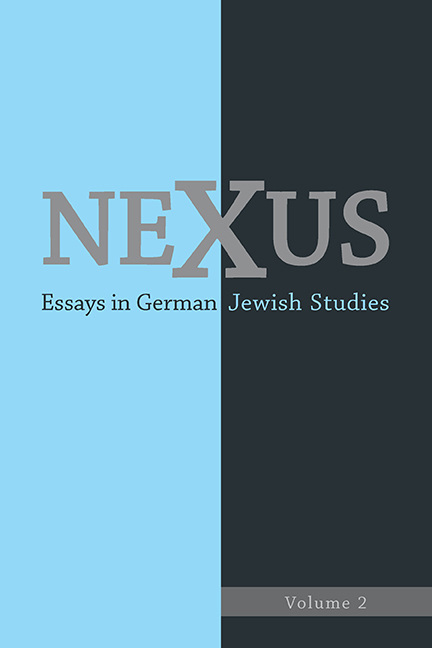Book contents
- Frontmatter
- Dedication
- Contents
- Acknowledgments
- Introduction
- Nexus Forum
- Introduction to the Nexus Forum A Most Unwanted Man: Hans-Joachim Schoeps
- Jew, Prussian, German: The Adventuresome Story of Hans-Joachim Schoeps
- Hans-Joachim Schoeps: Contrarian Scholar
- The Meyerowitz Family from Königsberg: Contemporaries of Hans-Joachim Schoeps
- From the Margins: A Response to Schoeps on Schoeps
- A Conservative Christian Welcome: A Response to Julius Schoeps
- Facing His Nazi Past? A Response to Schoeps on Schoeps
- Setting the Record Straight Regarding The Protocols of the Elders of Zion: A Fool's Errand?
- A Discussion of the “German” Dimension of Reform Judaism in Select Congregations in Three American Southern States, 1860–1880
- Weimar on Broadway: Fritz Kortner and Dorothy Thompson's Refugee Play Another Sun
- If I forget thee, O Jerusalem: The Jewish Exilic Mind in Else Lasker-Schüler's IchundIch
- “Seit ein Gespräch wir sind und hören können von einander”: Martin Buber's Message to Postwar Germany
- Hungerkünstler: George Tabori Directs Kafka in Bremen (1977)
The Meyerowitz Family from Königsberg: Contemporaries of Hans-Joachim Schoeps
from Nexus Forum
Published online by Cambridge University Press: 15 March 2018
- Frontmatter
- Dedication
- Contents
- Acknowledgments
- Introduction
- Nexus Forum
- Introduction to the Nexus Forum A Most Unwanted Man: Hans-Joachim Schoeps
- Jew, Prussian, German: The Adventuresome Story of Hans-Joachim Schoeps
- Hans-Joachim Schoeps: Contrarian Scholar
- The Meyerowitz Family from Königsberg: Contemporaries of Hans-Joachim Schoeps
- From the Margins: A Response to Schoeps on Schoeps
- A Conservative Christian Welcome: A Response to Julius Schoeps
- Facing His Nazi Past? A Response to Schoeps on Schoeps
- Setting the Record Straight Regarding The Protocols of the Elders of Zion: A Fool's Errand?
- A Discussion of the “German” Dimension of Reform Judaism in Select Congregations in Three American Southern States, 1860–1880
- Weimar on Broadway: Fritz Kortner and Dorothy Thompson's Refugee Play Another Sun
- If I forget thee, O Jerusalem: The Jewish Exilic Mind in Else Lasker-Schüler's IchundIch
- “Seit ein Gespräch wir sind und hören können von einander”: Martin Buber's Message to Postwar Germany
- Hungerkünstler: George Tabori Directs Kafka in Bremen (1977)
Summary
HANS-JOACHIM SCHOEPS AND MY FATHER, Karl Otto David Meyerowitz, were each born in East Prussia in 1909, my father in Königsberg, home of the Jewish Reform Movement inspired by Julius's ancestor Moses Mendelsohn. The intellectual and religious currents unleashed in the Jewish Enlightenment or Haskalah in the eighteenth century were still being played out in the lifetimes of both our fathers, in my family's case with a little different script but with the same defining characteristics. It may be instructive, then, to briefly sketch the story of another prominent German Jewish family from this milieu. It may provide a richer context for considering the perplexing case of Schoeps.
My father was born into an aristocratic Prussian Jewish family like the original Mendelsohns: his father was a wealthy textile factory owner with a house on the sea and a schooner with a captain and mate as well. Opa Benno Meyerowitz married Oma Kaethe Supplee, a Protestant Huguenot whose ancestors were from St. Petersburg and who, when Hitler came to power, converted to Judaism as a sign of resistance and family unity. She was a concert pianist and accomplished soprano, Benno served as a volunteer impresario of the Königsberg State Opera, and the family spent several nights a week either in the front row of the opera house or backstage watching the action unfold. My father knew Puccini and Verdi in German and studied voice while preparing to take over the family business after attending university. He had two older sisters, Eva and Leni, and their fateful lives also illuminate the social and intellectual world of Prussian Jewry in the 1920s and 1930s.
In 1922 my father became a Bar Mitzvah in the Great Liberal Synagogue of Königsberg where men and women sat separately and the men on such occasions wore cutaways and high hats. The famous cantor and composer, Louis Lewandowski, who died there in 1894, wore religious garb as well as a high yarmulke, and could have been mistaken for a Lutheran pastor. While the holidays were celebrated at home after a fashion, the Jewish calendar did not greatly influence the lives of the Meyerowitz family.
- Type
- Chapter
- Information
- NexusEssays in German Jewish Studies, pp. 29 - 32Publisher: Boydell & BrewerPrint publication year: 2013

